Psychiatric Comorbidities in Autism Spectrum Disorder
Uncover the complex world of psychiatric comorbidities in autism spectrum disorder. Explore challenges, treatments, and support for individuals.

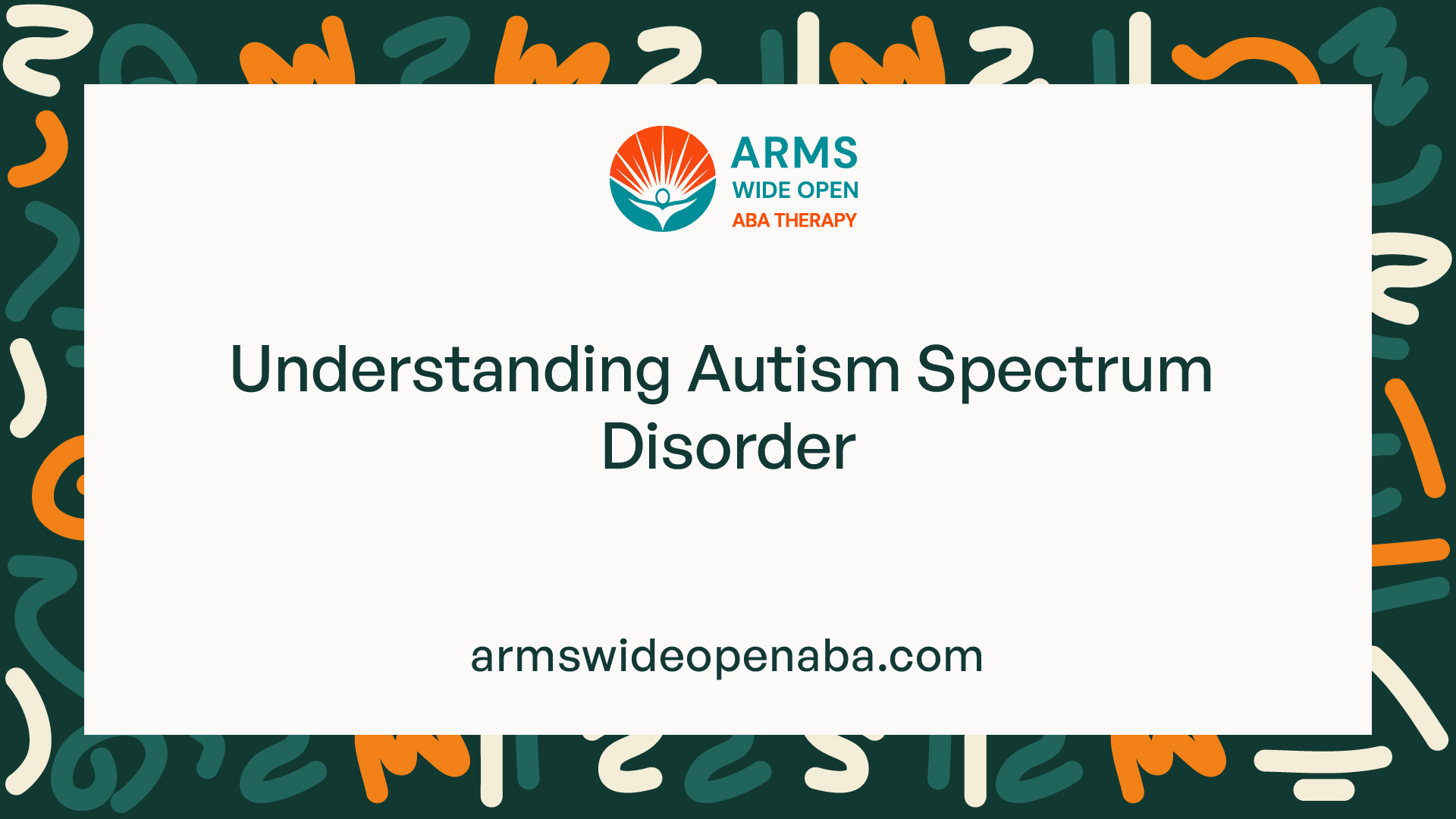
Understanding Autism Spectrum Disorder
Autism Spectrum Disorder (ASD) is a neurodevelopmental disorder characterized by persistent challenges in social interaction, communication, and restricted or repetitive behavior patterns. It is a complex and heterogeneous disorder that affects individuals differently. Understanding the definition, characteristics, prevalence, and diagnosis of ASD is crucial in exploring the psychiatric comorbidities associated with it.
Definition and Characteristics of Autism Spectrum Disorder
ASD is a lifelong condition that typically becomes evident in early childhood. It affects individuals across a wide range of abilities and can present with varying degrees of severity. The core characteristics of ASD include:
- Impairments in social communication and interaction: Individuals with ASD may have difficulties with verbal and nonverbal communication, such as understanding and using gestures, maintaining eye contact, and engaging in reciprocal conversations.
- Restricted and repetitive behaviors: This can manifest as repetitive movements or speech, insistence on sameness, intense interests or preoccupations, and sensory sensitivities.
- Challenges in social interaction: Individuals with ASD may struggle with social skills, making and maintaining friendships, and understanding social cues and norms.
Prevalence and Diagnosis of Autism Spectrum Disorder
ASD is a relatively common neurodevelopmental disorder, with a prevalence that has been increasing over the years. It is estimated that approximately 1 in 54 children in the United States are diagnosed with ASD. Boys are more likely to be diagnosed with ASD than girls, with a male-to-female ratio of around 4:1.
Diagnosing ASD involves a comprehensive evaluation that considers behavioral observations, developmental history, and standardized assessments. Medical professionals, such as psychologists, pediatricians, and psychiatrists, play a crucial role in diagnosing ASD. Early detection and intervention are key in promoting optimal outcomes for individuals with ASD.
Understanding the definition, characteristics, prevalence, and diagnosis of ASD provides a foundation for exploring the psychiatric comorbidities often associated with this complex neurodevelopmental disorder. These comorbidities can significantly impact individuals with ASD, making it essential to recognize and address them in a multidisciplinary approach to treatment.
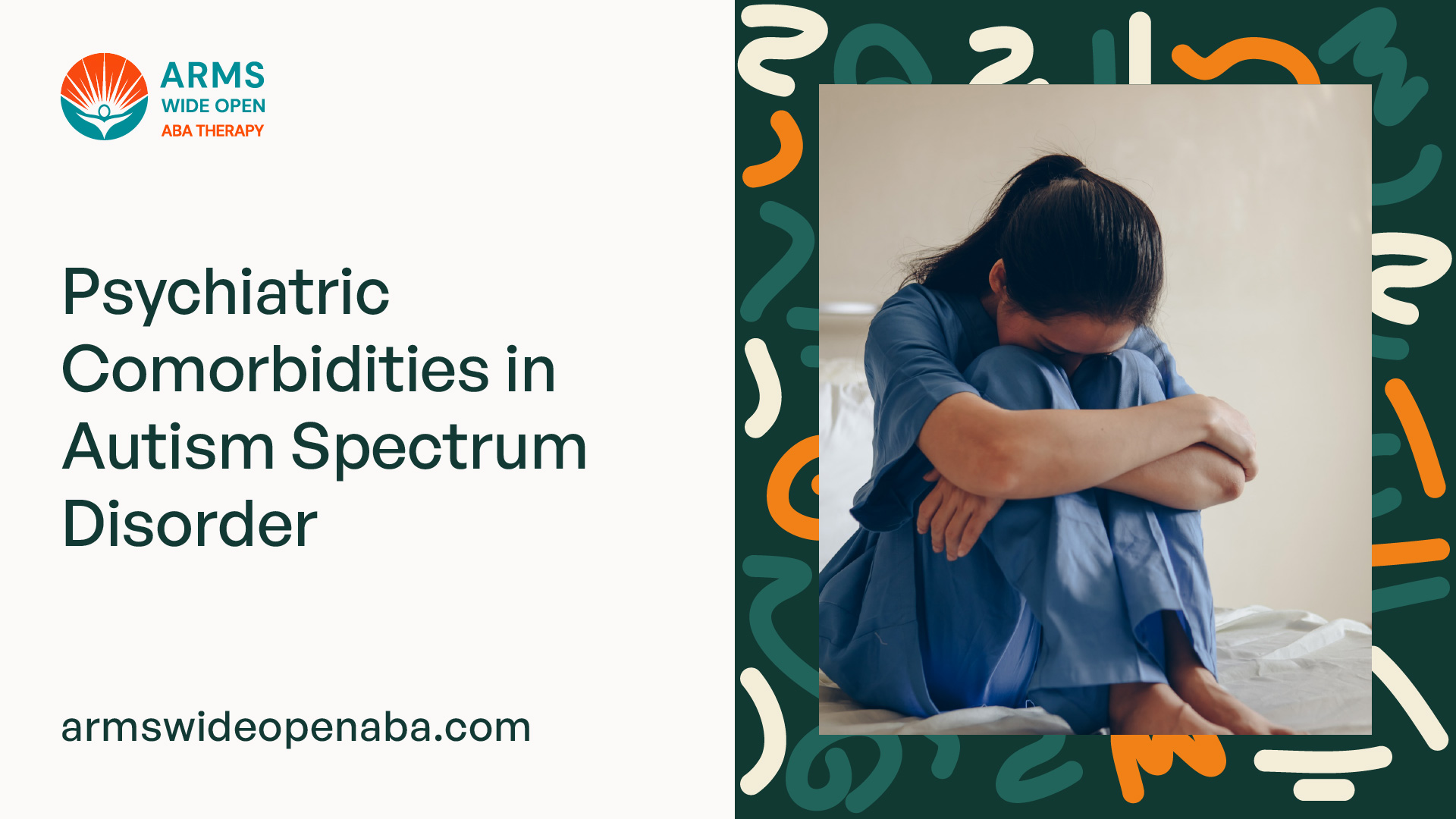
Psychiatric Comorbidities in Autism Spectrum Disorder
Individuals with Autism Spectrum Disorder (ASD) often experience psychiatric comorbidities, which are the presence of one or more additional psychiatric conditions alongside ASD. These comorbidities can significantly impact the lives of individuals with ASD, as well as their families and caregivers.
Definition of Psychiatric Comorbidities
Psychiatric comorbidities refer to the co-occurrence of psychiatric conditions alongside ASD. These conditions can include but are not limited to:
- Anxiety disorders
- Attention-deficit/hyperactivity disorder (ADHD)
- Depression
- Obsessive-compulsive disorder (OCD)
- Bipolar disorder
- Sleep disorders
- Social communication disorders
- Intellectual disabilities
- Sensory processing disorders
It is important to note that the presence of psychiatric comorbidities can vary from person to person with ASD. Some individuals may have one or more comorbidities, while others may not experience any. The combination and severity of these comorbidities can also differ, making each case unique.
Common Psychiatric Comorbidities Seen in Autism Spectrum Disorder
Psychiatric comorbidities are frequently observed in individuals with ASD. According to research studies, certain conditions tend to occur more frequently alongside ASD. The following table provides an overview of some common psychiatric comorbidities seen in individuals with ASD:

It is important to recognize that these prevalence rates can vary in different studies and populations. Additionally, individuals with ASD may have additional comorbidities not listed here.
Understanding the psychiatric comorbidities in individuals with ASD is crucial for providing appropriate support and treatment. Identifying and addressing these comorbidities can help improve the overall well-being and quality of life for individuals with ASD, as well as enhance their ability to engage in daily activities and social interactions.
Challenges and Implications
The presence of psychiatric comorbidities in individuals with Autism Spectrum Disorder (ASD) presents unique challenges and implications that need to be addressed. Understanding the impact of these comorbidities and the difficulties in diagnosing and managing them is crucial for providing effective support and care.
Impact of Psychiatric Comorbidities on Individuals with Autism Spectrum Disorder
Psychiatric comorbidities can significantly impact individuals with ASD, influencing their overall well-being and quality of life. The co-occurrence of psychiatric conditions can exacerbate the core symptoms of ASD, making it more challenging for individuals to navigate daily life and engage in social interactions.
Common psychiatric comorbidities in ASD include anxiety disorders, attention-deficit/hyperactivity disorder (ADHD), depression, obsessive-compulsive disorder (OCD), and sensory processing difficulties. These comorbidities can manifest in various ways, intensifying the cognitive, emotional, and behavioral challenges faced by individuals with ASD.
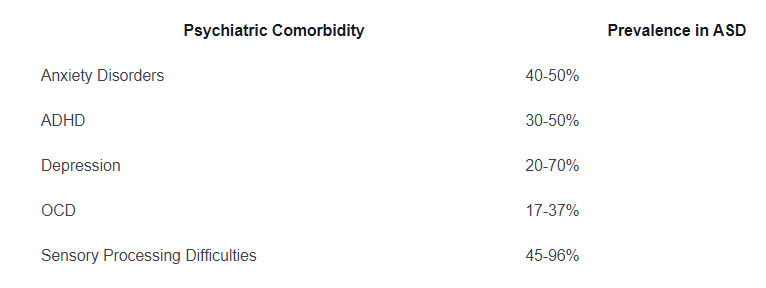
The impact of these comorbidities can range from increased stress and emotional dysregulation to difficulties in attention, executive functioning, and adaptive behaviors. They can also affect the ability to establish and maintain social relationships, participate in educational settings, and achieve independence.
Challenges in Diagnosing and Managing Comorbidities
Diagnosing and managing psychiatric comorbidities in individuals with ASD can be complex and challenging. The overlapping symptoms and atypical presentation of these conditions in the context of ASD can make accurate diagnosis and treatment planning more difficult.
One of the challenges is differentiating between symptoms that are part of ASD and those that indicate a separate comorbid psychiatric condition. The presence of ASD can mask or modify the expression of certain symptoms, leading to potential underdiagnosis or misdiagnosis.
Additionally, individuals with ASD may have difficulty expressing their emotions and experiences, making it challenging for healthcare professionals to gather accurate information during assessments. This can further complicate the diagnostic process and hinder the implementation of appropriate interventions.
Managing comorbidities in individuals with ASD requires a multidisciplinary approach that considers the unique needs and strengths of each individual. Treatment plans should be tailored to address both the core symptoms of ASD and the specific challenges associated with the comorbid conditions.
Collaboration between professionals from various fields, such as psychiatry, psychology, speech therapy, occupational therapy, and education, is essential to provide comprehensive support. Individualized interventions, including behavioral therapies, medication management, social skills training, and sensory interventions, may be incorporated into treatment plans to address the specific needs of each individual.
By acknowledging the impact of psychiatric comorbidities on individuals with ASD and recognizing the challenges in diagnosing and managing these conditions, we can strive to provide effective support and improve the overall well-being of individuals with ASD.

Approaches to Treatment
When addressing psychiatric comorbidities in individuals with Autism Spectrum Disorder (ASD), a comprehensive and individualized approach to treatment is essential. This section explores two important treatment approaches: multidisciplinary treatment approaches and individualized treatment plans.
Multidisciplinary Treatment Approaches
A multidisciplinary treatment approach involves collaboration among various healthcare professionals who specialize in different areas. This approach recognizes that individuals with ASD and psychiatric comorbidities may require interventions from multiple disciplines to address their complex needs effectively. Some key professionals involved in multidisciplinary treatment teams for ASD and psychiatric comorbidities may include:
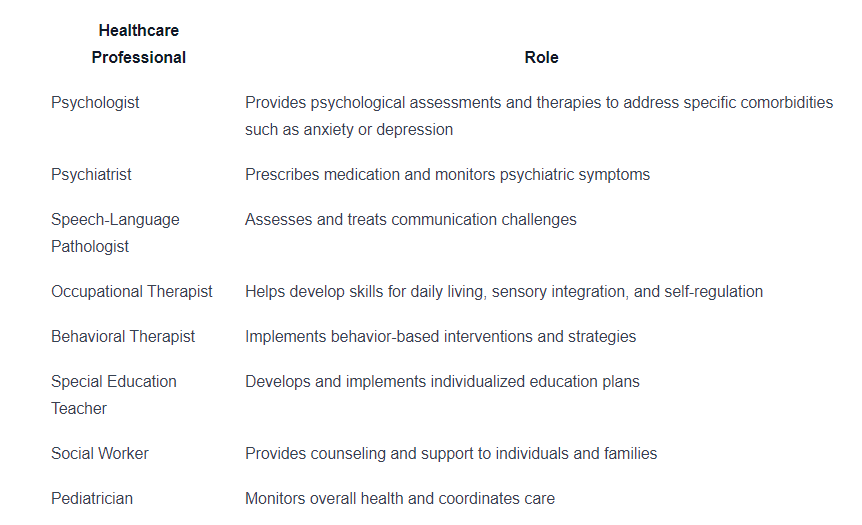
By involving a multidisciplinary team, individuals with ASD and psychiatric comorbidities can receive comprehensive care that takes into account their unique challenges and goals. The collaboration among professionals ensures a holistic approach, addressing not only the primary symptoms but also the associated comorbidities.
Individualized Treatment Plans
Recognizing that each individual with ASD and psychiatric comorbidities is unique, treatment plans should be tailored to their specific needs. Individualized treatment plans take into account the individual's strengths, challenges, preferences, and goals. These plans are developed based on a thorough assessment by the multidisciplinary team, considering the specific psychiatric comorbidities present.
An individualized treatment plan may include a combination of therapies, interventions, and supports that target the specific psychiatric comorbidities identified in the individual. This may involve cognitive-behavioral therapy, social skills training, medication management, speech and language therapy, occupational therapy, and educational accommodations.
The goal of an individualized treatment plan is to address the psychiatric comorbidities in a way that maximizes the individual's overall well-being and quality of life. Regular monitoring and adjustments to the treatment plan may be necessary as the individual's needs evolve over time.
By adopting a multidisciplinary treatment approach and implementing individualized treatment plans, individuals with ASD and psychiatric comorbidities can receive the comprehensive care they need to navigate the complexities of their condition. These approaches foster a holistic and person-centered approach, supporting individuals in reaching their full potential and enhancing their overall quality of life.
Support and Resources
Individuals with Autism Spectrum Disorder (ASD) who also experience psychiatric comorbidities require comprehensive support and access to resources that cater to their unique needs. This section highlights the various support services available for individuals with ASD and comorbidities, as well as educational resources for families and caregivers.
Support Services for Individuals with Autism Spectrum Disorder and Comorbidities
Support services play a crucial role in ensuring the well-being and quality of life for individuals with ASD and comorbid psychiatric conditions. These services offer assistance in managing the challenges associated with both ASD and the accompanying psychiatric comorbidities. Some common support services include:
- Therapies and Interventions: Various therapeutic interventions can help individuals with ASD and comorbidities. These may include applied behavior analysis (ABA), cognitive-behavioral therapy (CBT), speech therapy, occupational therapy, and social skills training.
- Mental Health Services: Access to mental health professionals, such as psychiatrists, psychologists, and counselors, is vital for individuals with ASD and comorbid psychiatric conditions. These professionals can provide assessment, diagnosis, and ongoing treatment to address specific mental health needs.
- Support Groups: Joining support groups can provide individuals with ASD and their families an opportunity to connect with others facing similar challenges. These groups offer a supportive environment for sharing experiences, exchanging advice, and finding emotional support.
- Community Programs: Community programs, such as recreational activities, vocational training, and social clubs, can help individuals with ASD develop skills, build social connections, and engage in meaningful activities.
- Respite Care: Respite care services provide temporary relief to caregivers of individuals with ASD and comorbidities. These services allow caregivers to take a break and attend to their own well-being, knowing that their loved one is in capable hands.
Educational Resources for Families and Caregivers
Families and caregivers of individuals with ASD and comorbid psychiatric conditions can benefit from educational resources that provide information, guidance, and strategies for managing the unique challenges they may encounter. Some valuable educational resources include:
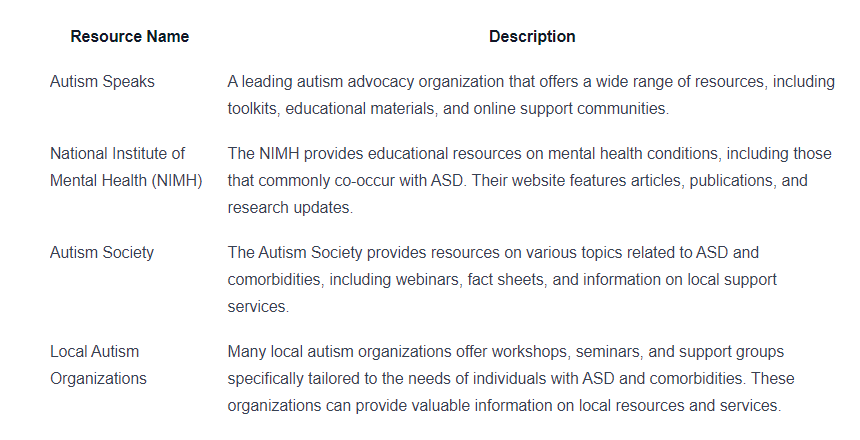
By availing themselves of these support services and educational resources, individuals with ASD and comorbid psychiatric conditions, as well as their families and caregivers, can gain the knowledge, guidance, and assistance necessary to navigate the complexities associated with their unique circumstances.
Future Directions
As our understanding of Autism Spectrum Disorder (ASD) and its psychiatric comorbidities continues to evolve, ongoing research and advancements are being made to improve our knowledge and treatment options. Additionally, advocacy and awareness efforts play a crucial role in supporting individuals with ASD and comorbidities. In this section, we will explore the future directions in understanding and treating psychiatric comorbidities in ASD, as well as the importance of advocacy and awareness.
Research and Advancements in Understanding and Treating Psychiatric Comorbidities in Autism Spectrum Disorder
Research focused on psychiatric comorbidities in ASD is expanding, aiming to deepen our understanding of the complex relationship between these conditions. Scientists and clinicians are investigating the underlying mechanisms that contribute to the development of comorbid psychiatric disorders in individuals with ASD. By identifying these mechanisms, researchers hope to develop more targeted and effective treatment approaches.
Advancements in genetics, neuroimaging, and biomarker research are shedding light on the shared biological pathways and risk factors associated with both ASD and psychiatric comorbidities. This knowledge can lead to the development of innovative interventions and therapies that address the specific needs of individuals with ASD and comorbidities.
Furthermore, clinical trials and studies are exploring the efficacy and safety of various treatment modalities for psychiatric comorbidities in ASD. These trials aim to determine the most effective pharmacological, behavioral, and psychosocial interventions for individuals with ASD and comorbid psychiatric conditions.
Advocacy and Awareness Efforts
Advocacy and awareness efforts are crucial for ensuring that individuals with ASD and comorbidities receive the support and resources they need. These efforts involve raising public awareness about the challenges faced by individuals with ASD and comorbidities, as well as promoting inclusivity and understanding in society.
Advocacy organizations and support groups play a vital role in advocating for policy changes that improve access to appropriate healthcare services and educational resources for individuals with ASD and comorbidities. They also provide a platform for individuals, families, and caregivers to share their experiences, seek guidance, and connect with others facing similar challenges.
Additionally, educational campaigns and community outreach programs aim to reduce stigma surrounding ASD and comorbidities. By fostering a more accepting and supportive environment, these efforts contribute to the overall well-being and quality of life of individuals with ASD and comorbid psychiatric conditions.
Through ongoing research, advancements in treatment options, and advocacy and awareness efforts, the future holds promise for individuals with ASD and comorbidities. By continuing to prioritize research, support, and understanding, we can strive towards a more inclusive and supportive society for individuals with ASD and comorbid psychiatric conditions.
Sources
https://www.frontiersin.org/journals/psychiatry/articles/10.3389/fpsyt.2021.673169/full
https://www.ncbi.nlm.nih.gov/pmc/articles/PMC6225088/
https://www.ncbi.nlm.nih.gov/pmc/articles/PMC9864301/
Similar articles
We’re here to help you

Our team is here to assist you in this process. Contact us for any assistance.
it’s easy to apply
We Accept Most Insurances
Our in-network insurance partnerships make ABA therapy more accessible to families throughout our service areas.







Our Insurance Process
We'll request your insurance details to help us verify your plan's coverage for ABA therapy. Once we've received this information, we'll walk you through your benefits, including copayments, deductibles and out-of-pocket maximums, so you know what to expect in advance.
Our team will then handle the preauthorization and all the necessary paperwork.
.svg)





















.jpeg)


































.jpeg)




.jpeg)







.jpeg)











.jpeg)
















